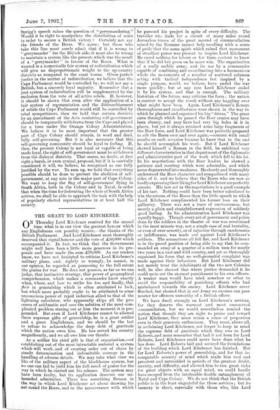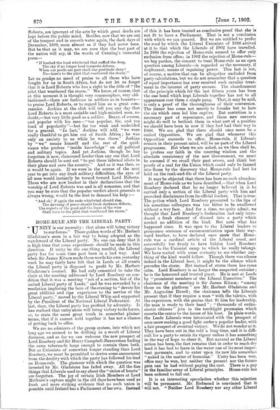THE GRANT TO LORD KITCHENER.
ON Thursday Lord Kitchener received for the second time what is in our view the greatest honour which any Englishman can possibly receive,—the thanks of the British Parliament. And Lord Kitchener most thoroughly deserved that signal honour and the vote of £50,000 which accompanied it. In fact, we think that the Government might well have been a little more generous in its pro- posals and have made the sum £70,000. As our readers know, we have not hesitated to criticise Lord Kitchener's military plans, and, rightly or wrongly, he cannot, in our opinion, be regarded as possessing to the full extent the genius for war. He does not possess, as far as we can judge, that instinctive strategy, that power of geographical comprehension, which makes a commander know exactly when, where, and how to strike his foe, and finally, that flair in generalship which is often attributed to luck, but which more probably ought to be attributed to some unconscious power of rapid induction allied to that of the lightning calculator, who apparently skips all the pro- cesses of arithmetic and sees the solution of the most com- plicated. problem staring out at him the moment it is pro- pounded. But even if Lord Kitchener cannot be allowed these supreme gifts of generalship, he is a great soldier and a great Englishman, and we should be the last to refuse to acknowledge the deep debt of gratitude which the nation owes him. He has served his country magnificently, and we all owe him our thanks.
As a soldier his chief gift is that of organisation,—of establishing out of the most intractable material a system which will work, and of creating order out of chaos by steady determination and indomitable courage in the handling of adverse details. We may take what view we like of the military aspect of the blockhouse system, but no one can fail to yield him his full meed of praise for the way in which he carried out his scheme. The system may have been faulty, but its application deserves our un- bounded admiration. There was something Roman in the. way in which Lord Kitchener set about drawing his net round the Boers. and in the perseverance with which he pursued his project in spite of every difficulty. The traveller who finds for a circuit of many miles round Jerusalem traces of the great mound of circumvallation raised by the Romans cannot help recalling with a sense of pride that the same spirit which raised that monument of steadfast power was present to inspire Lord Kitchener. He cared nothing for labour or for time, content to know that if lie did but press on he must win. The organisation of a really mobile army, and its use by a commander capable of combining and co-ordinatiug into a harmonious whole the movements of a number of scattered columns acting with tactical independence but inspired by a single purpose, would, we believe, have ended the war more quickly ; but at any rate Lord Kitchener ended it by his system, and that is enough. The military historian of the future may criticise the form ; the nation is content to accept the result without any haggling over what might have been. Again, Lord Kitchener's Roman thoroughness and steadfastness were shown in the way in which he planned and organised his big "drives." The great sieve through which he passed the Boer armies may have been clumsy, and may have had very big holes in it in places, but yet it always retained some large fragments of the Boer force, and Lord Kitchener was perfectly prepared to sift the Boers over and over again,—content with small results on each occasion because he knew that in the end he should accomplish his work. But if Lord Kitchener showed himself a Roman in the field, he exhibited very different characteristics in that department of the diplomatic and administrative part of the work which fell to his lot. In his negotiations with the Boer leaders he showed a patience and courtesy which were admirable, and which never degenerated into weakness. He clearly and thoroughly understood the Boer character and sympathised with many sides of it, and we believe that the Boers who are now so loudly expressing their liking for Lord Kitchener are perfectly sincere. His last act in the negotiations is a good example of his tact. Nothing could have been better calculated to win the esteem of the Boers than the little speech in which Lord Kitchener complimented his former foes on their gallantry. There was not a trace of unctuousness, but merely a plain and straightforward expression of soldierly good feeling. In his administration Lord Kitchener was equally happy. Though every act of government and police done by the soldiers in the theatre of war was scrutinised in the most minute way, not a single case of real brutality, or even of over-severity, or of injustice through carelessness or indifference, was made out against Lord Kitchener's soldiers. The accusations all fell flat, and Lord Kitchener is in the proud position of being able to say that he com- manded an army of a quarter of a million men for nearly two years in a vast and wild country, and yet so thoroughly organised his force that no well-grounded complaint was made against their behaviour. But Lord Kitchener did not merely treat the inhabitants of the two new Colonies well, he also showed that where justice demanded it he could mete out the sternest punishment to his own officers. A weaker man would have tried somehow or other to avoid the responsibility of punishing officers who had misbehaved towards the enemy. Lord Kitchener never flinched, but showed that in our Army no excuses can pass muster for offences unworthy of a British officer.
We have dwelt strongly on Lord Kitchener's services, for they deserve the warmest and most unreserved commendation, but we would nevertheless remind the nation that though they are right to praise and reward Lord Kitchener, they must retain a sense of proportion even in their generous enthusiasm. They must, above all, in acclaiming Lord Kitchener, not forget to keep in mind the supreme debt of gratitude which they owe to Lord. Roberts, and must remember that had it not been for Lord. Roberts, Lord Kitchener could never have done what he has done. Lord Roberts laid and secured the foundations of the building which Lord Kitchener has finished. But for Lord Roberts's power of generalship, and for that in- comparable serenity of mind which made him cool and prescient and untroubled in periods of the greatest doubt, anxiety, and difficulty, and allowed him to run great risks for great objects with an equal mind, we could hardly have escaped from the intolerable double entanglement of Natal and Cape Colony. We do, not think that the British public is in the least ungrateful for those services ; but its memory is short, especially with those who, like Lord Roberts, are ignorant of the arts by which great deeds are kept before the public mind. Besides, now that we are out of the tempest and in smooth water again, the dark days of December, 1899, seem almost as if they had never been. But be that as it may, we are sure that the best part of the nation will say, in the words of Canning's immortal poem-
" If hushed the loud whirlwind that raffled the deep, The sky if no longer loud tempests deform, When our perils are past shall our gratitude sleep ? No—here's to the pilot that weathered the storm!"
Let us grudge no meed of praise to all those who have fought for us in South Africa, but do not let us forget that it is Lord Roberts who has a right to the title of " the pilot that weathered the storm." We know, of course, that at this moment it is thought very commonplace, very old- fashioned—there are fashions in soldiers as in bonnets— to praise Lord Roberts, or to regard him as a great com- mander. Jorkins at the club will tell you any day that Lord Roberts is a most amiable and high-minded man, no doubt,—but very little good as a soldier. Brave, of course, and popular with his men—" too popular, Sir, and too fond of popularity "—but far too weak and undecided for a general. "In fact," Jorkins will add, "we were really thankful to get him out of South Africa ; he was only an anxiety to us while he was there." Jorkins by " we " means himself and the rest of the quid- nuncs who profess " inside knowledge " on all political and military topics. And yet Jorkins, though he has forgotten it now, clamoured louder than any one that Lord Roberts should be sent out " to put those infernal idiots in their place and save the country." And as it was then, so it would be again. If we were in the course of the next year to get into any fresh military difficulties, the eyes of all men would instantly be turned toward Lord Roberts. Those who are now loudest in their declarations that the worship of Lord Roberts was and is all nonsense, and that you may be sure that the popular verdict about generals is always wrong, would be the first to demand his help :-
"And oh ! if again the rude whirlwind should rise, The dawning of peace should fresh darkness deform, The regrets of the good and the fears of the wise Shall turn to the pilot that weathered the storm."







































 Previous page
Previous page